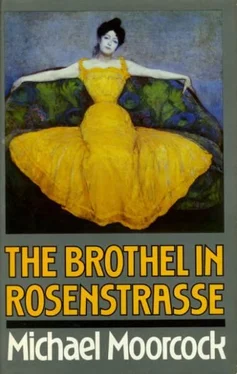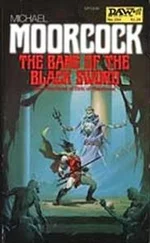Michael Moorcock - The Brothel in Rosenstrasse
Здесь есть возможность читать онлайн «Michael Moorcock - The Brothel in Rosenstrasse» весь текст электронной книги совершенно бесплатно (целиком полную версию без сокращений). В некоторых случаях можно слушать аудио, скачать через торрент в формате fb2 и присутствует краткое содержание. Жанр: Эротические любовные романы, на английском языке. Описание произведения, (предисловие) а так же отзывы посетителей доступны на портале библиотеки ЛибКат.
- Название:The Brothel in Rosenstrasse
- Автор:
- Жанр:
- Год:неизвестен
- ISBN:нет данных
- Рейтинг книги:3 / 5. Голосов: 1
-
Избранное:Добавить в избранное
- Отзывы:
-
Ваша оценка:
- 60
- 1
- 2
- 3
- 4
- 5
The Brothel in Rosenstrasse: краткое содержание, описание и аннотация
Предлагаем к чтению аннотацию, описание, краткое содержание или предисловие (зависит от того, что написал сам автор книги «The Brothel in Rosenstrasse»). Если вы не нашли необходимую информацию о книге — напишите в комментариях, мы постараемся отыскать её.
The Brothel in Rosenstrasse — читать онлайн бесплатно полную книгу (весь текст) целиком
Ниже представлен текст книги, разбитый по страницам. Система сохранения места последней прочитанной страницы, позволяет с удобством читать онлайн бесплатно книгу «The Brothel in Rosenstrasse», без необходимости каждый раз заново искать на чём Вы остановились. Поставьте закладку, и сможете в любой момент перейти на страницу, на которой закончили чтение.
Интервал:
Закладка:
Herr Pasitch eats his Kalbsaxe and discusses international politics with his uncritical sons and daughters. They are expecting a guest. My first memories of Mirenburg are of the Restaurant Schmidt. Father had taken me to the city for a reason. I had spent some part of the summer at a private academy before being sent on to school in Heidelberg. I recall skiffs and tea-gardens. Mirenburg had seemed a haven of peace and stability in Europe. I am inclined to resent any politics here. Mirenburg is a retreat; I escape to her. I always expected to find an Alexandra in Mirenburg so I scarcely question my fortune. We drive into the early afternoon.
Herr Pasitch’s guest has arrived, seating himself with a flourish and drawing the full attention of the Pasitch daughters. He is Herbert Block, the popular song-writer; selfish, humorous and charming. Without favouritism he has looted the romantic lyrics of antecedents and contemporaries to considerable profit. Few of the victims complain. His charm is such that, although he is now nearing forty, people still regard him as a schoolboy whose pranks do no real harm, and, while he remains witty and vain, he will always have tolerant friends, especially amongst women. His dark eyes are professionally active. His dark hair might now be dyed. He leans back in his chair and flashes an expert smile. Herr Pasitch explains the strategies of Bismarck. Herr Block turns the conversation to the exploits of Count Rudolph Stefanik, the famous Czech balloon adventurer, who was recently forced to leave Zurich under scandalous conditions and narrowly missed having his vessel seized and burned by outraged citizens. They had welcomed him as a hero and he had thoroughly abused their hospitality. ‘Caught in the basket!’ says Herr Block. ‘He is a dear friend of mine. But, O!’ This episode, involving a young lady of previously good reputation, was not dissimilar to many others in the Count’s history. ‘His adventures have spanned five continents.’ Getting some wind of the composer’s drift, Herr Pasitch firmly steers the topic back to Bismarck. Herr Block smiles at the women as if in defeat. He suggests that they might like to repair later to the Straus Tea Gardens, to the south of Mirenburg, on the river. ‘To catch the last of the summer.’
From these gardens, some five miles away, one can watch the trains crossing the long viaduct which spans the valley where the Ratt widens. It has thirty-two arches and was completed in 1874 by engineers from the Rhineland.
According to legend a man lost his life for every arch completed and some of the victims are said to lie beneath the plinths, their ghosts occasionally appearing on the track at night, causing drivers to apply their brakes and bring trains to an alarming halt. Usually these ghosts are discovered to be baffled deer or wolves which have strayed on to the bridge and are unable to escape.
Five minutes from the Restaurant Schmidt, in Edelstrasse, a narrow street running parallel to Falfnersallee, is the Restaurant Anglais. Socialists gather here, followers of Kropotkin, Proudhon and Karl Marx, to debate how much support they have in Parliament and how soon the workers in the Moravia will grow tired of their lot and rise against their masters. They wear grey frock-coats and high collars but only a few have the soft felt hats and loose ties of the conventional radical. In the same street, at the Hotel Dresden, are members of the League of St Ignatz, a little older, on average, but otherwise very similar to the clientele at the Restaurant Anglais. These strong conservatives are almost as suspicious of the socialists as they are of the Jews, the Jesuits and the Freemasons, whom they term the ‘super-national powers’, deliberate fomentors of war and rebellion. It is early afternoon. Socialists and conservatives begin to return to offices where they will mingle and conduct the business of Mirenburg with exactly the same degree of zeal shown by their non-political colleagues.
A squadron of cavalry, its bright blues and golds softened by the September sun, rides past one end of Edelstrasse, on its way to guard the Kasimirsky Palace, where Parliament meets (today it debates a new Armaments Bill); and in the other direction goes a closed carriage bearing the arms of Hungarian Archduke Otto Budenya-Graetz, exiled from his own country by relatives who pay him to stay abroad. His reputation is so villainous not even the lion-hunting ladies of the Regenstrasse invite him to their salons. It is said he always has a small revolver with him. So many attempts have been made on his life by jealous lovers or their husbands, he carries the weapon for self-defence. The carriage turns down toward the river, passing the neo-classical Customs House, and heading inevitably for Rosenstrasse. Alexandra’s teeth touch the pale flesh of chicken and I raise my champagne glass to her. The shadows already begin to lengthen. I recall my second visit to Mirenburg, the lilacs against a bright blue sky which deepened to violet at sunset; then I had spent considerable time and most of my money at the Casino. I had a passion for roulette and the Circus. Both Casino and Circus still exist, but I have so far visited neither.
Our landau takes us back to our hotel. We smell crisp Leckerli gingerbread in the hands of schoolchildren who file out of the bakeshops on their way home. I tell Alexandra of the summer in the cottage when I was a boy, of my father coming to visit us. I had the impression almost everything was white and yellow, and even now when I recall the cornflowers I am astonished at this sudden infusion of brilliant blue into my memory. I can, I tell her, with effort also re-experience the red-orange of the poppies, but I suspect this might be a false recollection, or at least one from a later period.
The smell of those poppies, however, is almost always with me, whenever I think of them. I am under the impression I am losing Alexandra’s attention, but we shall soon be back at the hotel and I know how to recapture her quickly enough. I begin the story of the consumptive twins and their dog, even before we have left the carriage, although my mind is still obsessed with that scent of poppies and I wonder why I should associate it so strongly with sexual passion. Perhaps both are capable of absorbing one’s total attention. Yet I could not have been more than seven when we paid our last visit to the country. Papadakis wishes to retire. He asks if he can douse my lamp. I shake my head and tell him to go. I remember, as I escort Alexandra through the lobby, the first woman I became infatuated with. She was married and her husband was abroad in some small German colony. ‘You are a sympathetic friend,’ she had said to me. ‘And sometimes that is the last thing one seeks in a lover.’ She had laughed. ‘That is the job of the husband.’ She taught me an excellent lesson. Once again, as I prepare to bathe, I consider the relationship between passion and power, between sexuality and spiritual fulfillment, the realisation of the Self. I complete the story of the twins. Alexandra begins to laugh and becomes helpless.
Her arms grip my back, her legs encircle my thighs; I begin the slow injection. ‘Never stop loving me,’ she says. ‘Promise me.’ I promise. ‘And I will never stop loving you,’ she says. But I am a fiction. My reality could destroy me. She is a dream and I shall never stop loving her. We are silent now. I move further into that tiny flame, the gateway to a universe of pleasure; beyond her vagina is infinity, immortality, marvellous escape. She is yelling. Her nails stab into my buttocks and my cries join hers. She lies with her curls against my neck and shoulder. I stroke her arm in the long twilight. ‘Shall we go to Roberto’s?’
‘I am too tired,’ she says, ‘for the moment. Let us have an early supper here and then see.’
Читать дальшеИнтервал:
Закладка:
Похожие книги на «The Brothel in Rosenstrasse»
Представляем Вашему вниманию похожие книги на «The Brothel in Rosenstrasse» списком для выбора. Мы отобрали схожую по названию и смыслу литературу в надежде предоставить читателям больше вариантов отыскать новые, интересные, ещё непрочитанные произведения.
Обсуждение, отзывы о книге «The Brothel in Rosenstrasse» и просто собственные мнения читателей. Оставьте ваши комментарии, напишите, что Вы думаете о произведении, его смысле или главных героях. Укажите что конкретно понравилось, а что нет, и почему Вы так считаете.







